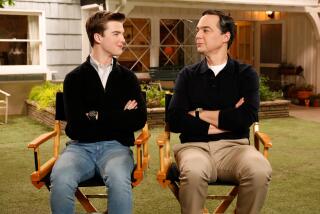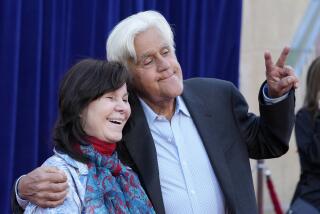Disney pulls TV signal in NYC area
Potentially leaving millions of New York City-area homes unable to watch Sunday’s Oscar telecast, Walt Disney Co. pulled its WABC-TV signal off Cablevision Systems Corp. at midnight Saturday as part of a fight over carriage fees.
The action -- coming on the eve of one of television’s biggest events and affecting more than 3 million customers in New York, New Jersey and Connecticut -- is the most dramatic demonstration yet of the escalating stakes between media giants as they wrestle with determining the value of content.
Disney could still restore the signal of its ABC station before the Academy Awards begin at 8 p.m. EST.
The two companies are fighting over fees Disney wants Cablevision to pay for the right to retransmit WABC on local cable systems.
Though feuds between programmers and distributors are commonplace, it is rare for a signal to be yanked, let alone hours before a ratings monster like the Oscars.
Late last year, News Corp.’s Fox and Time Warner Cable engaged in a bitter fight for several weeks, but ultimately struck a deal without Fox’s signal being pulled.
Frustrated by a lack of progress in negotiations over retransmission, Disney last week said it was prepared to pull WABC from Cablevision’s systems at midnight Saturday. With the Oscars airing Sunday night, Disney and ABC were clearly hoping to pressure Cablevision into a deal. But Cablevision, a family-owned company founded by Charles Dolan and now run day-to-day by his son James, has shown little indication of caving in to the pressure.
Disney’s decision to yank its local ABC station off Cablevision’s cable systems is a risky move for Disney chief Robert Iger, who risks both angering viewers and fallout from advertisers unhappy about how the move will affect ratings for the Academy Awards show.
The risks are no less for Cablevision, which could lose customers who switch to rival TV services, such as those provided by satellite broadcasters or phone companies.
Cablevision has said that Disney is demanding $40 million annually for carriage of WABC, which would translate to about $1 per subscriber per month. Disney has denied that figure but has not elaborated on what fee it is seeking. Cablevision has noted that it already pays $200 million to Disney to carry its cable networks, including ESPN, Disney Channel and ABC Family.
In a statement, ABC said, “Cablevision has once again betrayed its subscribers. . . . This follows two years of negotiations during which we worked diligently, up to the final moments, to reach an agreement.”
Cablevision replied that “it is now painfully clear to millions of New York area households that Disney CEO Bob Iger will hold his own ABC viewers hostage in order to extract $40 million in new fees from Cablevision. We call on Bob Iger to immediately return ABC to Cablevision customers while we continue to work to reach a fair agreement.”
Disney countered that deals for ESPN and other cable channels have nothing to do with a deal to carry WABC. Cablevision, Disney said, already charges its customers a fee to receive the signal of WABC as part of its basic cable package, and Disney simply wants its rightful share of money that the cable company is already receiving.
One potential danger for both companies is that if the signal stays off and customers start complaining, it won’t be long before politicians and regulators jump into the fray and threaten action.
Last week, Sen. John F. Kerry (D-Mass.) urged the Federal Communications Commission to find a way to ensure that consumers don’t get caught up in carriage spats between media companies.
Rep. Joe Barton of Texas, the ranking Republican on the House Energy and Commerce Committee, told the FCC that the regulatory agency should stay out of the matter and let Disney and Cablevision settle it.
--
More to Read
The biggest entertainment stories
Get our big stories about Hollywood, film, television, music, arts, culture and more right in your inbox as soon as they publish.
You may occasionally receive promotional content from the Los Angeles Times.







